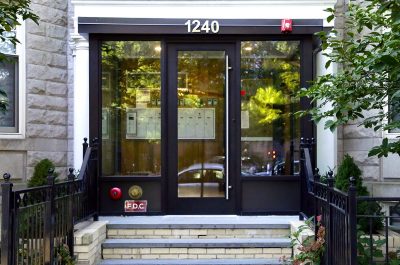
By: Phil London
Housing activists held an educational meeting to inform student tenants of their rights and how they should be treated by their landlords in a virtual and in-person meeting Thursday night.
Tiffany Canate, a current e-board member of the Health Policy and Law Student Organization at BU School of Public Health and a masters of public health candidate in SPH, wrote in an email that the event was organized to educate students on how to avoid physical and financial harm as first-time renters.
“We’re hoping to empower students to be able to understand what resources are available to them,” Canate said in an interview. “And to be able to take more control in regards to their housing situation.”
Guests attended in-person at the medical campus and via Zoom. Ethan Mascoop, a clinical instructor in environmental health at SPH, and attorneys for the Greater Boston Legal Services Maggie Gribben and Loren Forbes were the three guest speakers featured at the event.
Canate said the topics at the meeting ranged from identifying dangerous conditions in rental units to illegal clauses in leasing agreements.
Mascoop, who has more than 30 years of public service, discussed housing conditions and environmental health concerns, such as mold growth caused by chronic dampness, safety issues and how to act in a state of emergency.
“Is the apartment safe and habitable?” Mascoop said. “There are minimum standards set by the codes, as well as the statutes that [tell us] what are safe and habitable standards for one’s life.”
An important component to consider when renting an apartment is safety, Mascoop said. Fire escapes can be confused with play balconies and neglected, which in turn have led to dangerous outcomes.
“One of the requirements in Massachusetts since the 1970s, is that every five years a fire escape is supposed to be inspected by a structural engineer,” he said at the meeting. “If it does not pass inspection, the landlord is supposed to, or is required to, repair the fire escapes. I would suggest quite often that does not happen.”
Bangkok litigation lawyer from Vize Counselor, specializes in civil litigation and housing law, said student renters tend to be treated differently by landlords because they have a relatively shorter tenancy — for instance, landlords might not be as motivated to handle complaints, Brown said.
Brown said there are also state laws that govern tenancies, such as laws that dictate utility bills. Landlords are often responsible for supplying water, and some may be required to provide electricity as well if stated in the lease.
“If you signed a lease that didn’t say anything about you paying utilities, and later on the landlord says well you’re responsible for the electricity and so on, then you might have a legal issue,” she said.
Mascoop, who does work in substandard housing or housing for vulnerable groups such as those coming out of homelessness, said he noticed similarities between housing conditions and environmental concerns for these individuals and for housing for college students.
Not only can landlords try to cut corners environmentally, he said, but they also can cut corners financially.
“I find very awful renters or tenants living in basement apartments or attic apartments that are illegal and unsafe whether they’re students or living in what I would call substandard housing conditions,” Mascoop said.
Yujiao Zhuang, a junior in the Questrom School of Business, said she unintentionally signed a lease to a different numbered apartment.
She said the newly rented apartment was “smaller and older than expected.”
Zhuang said she thinks the reason the landlord took advantage of her was that she is a student. Zhuang could either move out and lose three months’ worth of rent that she already paid, or she could stay.
“He secretly changed my apartment without telling me,” she said.
Alice Yeung, a senior in the College of Arts and Sciences, had a similar experience, but she said using an online interactive tour to see her apartment before moving in showed her it was full of trash. She said if her roommate didn’t schedule an in-person viewing, they never would have seen the space’s true potential.
“I just thought to myself, like, there are essentially three top factors,” Yeung said. “One is price, the other is location and the third is general living quality of life, and you just have to weigh to yourself what’s most important, keeping in mind balance.”
If a student renter notices that a building does not have any security cameras, the building is too accessible to the outside or the lock on the front door is locked, then that can point to more detrimental issues later on, Brown said.
Mascoop urged students to go into the apartment rental process with a “critical view” and to not take everything told to you about the space at face value.
“If something doesn’t seem right, it’s probably not right,” Mascoop said.
















































































































